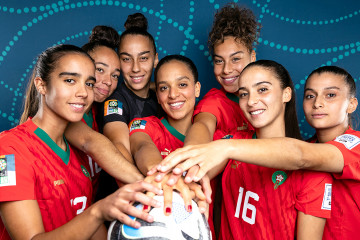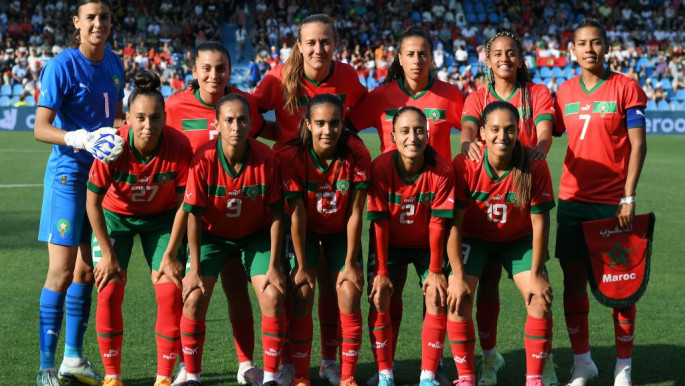

Morocco and the Arab region could hardly have asked for a more difficult introduction to the Women’s World Cup that is about to kick off in Australia and New Zealand.
On July 24, the Atlas Lionesses will play Germany in Melbourne, a first-ever game on the global stage against a team ranked number two in the world.
Any kind of result for the North African side ranked 70 places lower would be seen as the most significant result in the history of women’s football in the Arab world. Even a close defeat would be cause for satisfaction.
"Whatever happens, Morocco’s women have already made history. They made the nation proud last year on home soil and just being at the top table of world sport is a fine achievement"
The Journey
But Morocco has shown that it can make history and confound expectations. They qualified through the Women's African Cup of Nations (WAFCON). Before the 2022 tournament, no Arab team had made any impact in the previous 13 editions of the continental event.
Algeria had played in five but had won just two out of their 15 previous games. Egypt and Morocco had two attempts and did little. Tunisia had a single, forgettable appearance back in 1998.
It all changed in a few dramatic days as Morocco made headlines around Africa and then around the world for the team’s exploits on the pitch and the nation’s actions off it.
They won their group, then defeated Botswana in the quarter-final. That set up a huge semi-final with Nigeria, who had won 11 of the 13 editions. There were 50,000 fans, an African attendance record, in Rabat to watch the hosts win a dramatic penalty shootout that sent a nation wild.
The pride and excitement, including messages of congratulation from King Mohammed VI, was still felt after losing to South Africa in the final especially as the team had qualified for the World Cup.
The Players
In Australia and New Zealand, much will depend on one of the stars of that African run. Ghizlane Chebbak was named player of the tournament and the 32-year-old, whose father was a celebrated international, carries much of the team’s goal threat.
The striker plays for Rabat club AS FAR but it is no coincidence that Morocco’s success has come with the team recruiting eligible players from Europe and bringing in players with experience in some of the biggest and best women’s leagues in the world. Thirteen of the 23-player squad play their football in Europe.
One of the team’s stars Rosella Ayane plays for Tottenham in England and represented England’s youth teams before representing the Atlas Lionesses due to having a Moroccan father. Fatima Tagnaout is based locally and the midfielder was named as the Player of the Tournament in last year’s African Champions League.
|
The Coach
Reynald Pedros has been in charge of the team since late 2020. The Frenchman has instilled a never-say-die team spirit and brought a huge deal of experience as one of the most highly thought of coaches in the women’s game.
He led Lyon to two French and two European Champions League titles. Getting Morocco out of the group would rank alongside such achievements.
“As I said to the girls, we’ll be ready for the first match against Germany and we’ll do what we can in the group phase to qualify for the last 16,” he told FIFA.
“Then it all comes down to how much work you put in. We know that Germany, Korean Republic and Colombia are happy to be playing Morocco. It’s up to us to show them that it’s not going to be that easy for them and that we’re going to give it our best shot to qualify. If we get it into our heads that we can do it, then we’ll be in a position to go and do just that.”
The Group
Group H, from which the top two of the four teams progress, is a tough one. It starts against Germany, one of the best teams in the world and a real powerhouse. World champions in 2003 and 2007, they have never not reached the last eight.
They have also won nine of the last 12 European championships but were defeated by England in the final in 2022. It is a team packed with experienced stars playing at the highest levels.
It could be that taking on the strongest team first means that Morocco can catch the Germans cold and opening games can be cagey affairs as both teams are desperate not to lose. Yet it will be a major shock if Morocco can avoid a defeat.
|
The crucial game may well be the second one. South Korea, ranked 17, is not seen as a powerhouse in women’s football but has been steadily improving.
With stars such as Ji So-yun, who spent years at Chelsea, they are appearing in a fourth tournament and have reached the second round once. They arrive in Australia, like Morocco, as continental runners-up but they really should have beaten China in the Asian final after taking a 2-0 lead before blowing it at the end. Asia is a stronger continent in women’s football with Japan champions in 2011.
It ends with Colombia, another tricky opponent who will see Korea as a rival for the second spot. The South Americans ranked 25 in the world, reached the second round in 2015 in their second and most recent appearance.
Another continental finalist, they will be tough opposition in every sense of the word. A recent warm-up against Ireland was abandoned after 20 minutes with the European team concerned at what they regarded as overly physical play from the opponents.
Legacy
Whatever happens, Morocco’s women have already made history. They made the nation proud last year on home soil and just being at the top table of world sport is a fine achievement.
Already, they have given the women’s game unprecedented exposure and served as inspiration for an entire region.
“The qualification of the women’s team for the finals at the Africa Cup of Nations, the media momentum and the wide audience that followed … breathed new life into women’s soccer in Morocco,” Khadija Illa, president of the national women’s soccer league, told the Associated Press. “Nothing is impossible,” she said. “If they work and plan, other teams can make it too.”
It could move up to the next level at the World Cup. A new future could be written.
John Duerden has covered Asian sports for over 20 years for The Guardian, Associated Press, ESPN, BBC, and the New York Times, as well as various Asian media. He is also the author of four books
Follow him on Twitter: @johnnyduerden






 Follow the Middle East's top stories in English at The New Arab on Google News
Follow the Middle East's top stories in English at The New Arab on Google News


